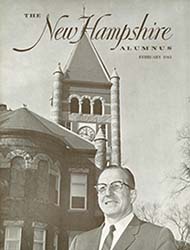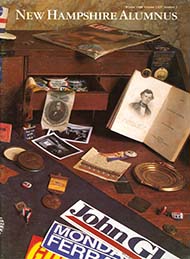 |
 |
| current issue |  | past issues |  | send a letter/news |  | address update |  | advertise |  | about us |  | alumni home |
Rearview Mirror

|
100 years ago, The New Hampshire,
Feb. 19, 1913:
"Does the man who persists in annoying chapel speakers by tinkling his brass watch fob on the back of his Ingersoll realize that he is not acting the part of a gentleman? Can a student be considered competent to voluntarily suggest the conclusion of a speaker's address? There are three kinds of men—those without brains, those with unused brains, and those with brains which are useful. The brainless men never come to college; those with normal intelligence evoke no criticism. The college man who is not always a gentleman is in the pitiable class. He has brains but he does not use them."
—From an untitled column. (An Ingersoll was a type of pocket watch.)

|
75 years ago in the New Hampshire Alumnus,
January 1938:
"When the first snow of the year fell in the little Vermont town in which I was born, the boys of the neighborhood used to strap barrel staves to their feet, and with these primitive skis, glide down the hill behind the schoolhouse. Things are different now. There are still plenty of youngsters in knee pants sliding around on barrel staves, but keeping them company are older folks. Each winter finds additional thousands of Americans spending week-ends in the hills where they can enjoy the thrills of skiing. Department stores have opened ski departments, complete with borax practice slides, and railroads operate special ski trains to the best ski runs. Hotels and lodges which once only catered to summer tourists are now doing a thriving business during the winter months. The amount of money spent on skiing probably totals several million dollars annually."
—From "The Sky's the Limit," by Edward J. Blood '35, who earned 10 varsity letters at UNH and competed as a member of the U.S. ski team in the 1932 and 1936 Winter Olympics. He was hired in 1936 to coach the ski team, later serving as a football trainer and an assistant track coach. When he retired in 1970, his title was "Professor and Supervisor of Athletic Facilities and Equipment." He died in 1991 at age 82.

|
50 years ago in the New Hampshire Alumnus,
February 1963:
"'The Los Negros Leper Colony contains a small bare hospital, a few acres of land, and about 20 mud huts. It was previously run under the direction of a religious mission called New Tribes. Often native arrows were swifter than the Word, so the New Tribes mission has been rather prone to personnel shortages. All parties concerned have asked the Peace Corps to take over. My wife, Linda, will be running the hospital and I will be the administrator. I'll be trying to develop small industries and improve agriculture. We hope to introduce solar cookers. But the immediate problem is this: The normal food ration for the 120 patients had to be cut in half, with the complete exclusion of meat. We have about a month's supply of drugs. With the garden coming into yield, we can hold out for about two months longer. One of the most helpful ways for individuals to help is to go to as many doctors as possible and ask them to donate the samples they receive from drug companies. For anybody who wants to get his dollar's worth of charity, this is the place. People die here for the lack of so little.'"
—From "Help Needed in Bolivia," which relayed a request for assistance from Donald Bullock '60, a mechanical engineer who joined the Peace Corps in 1962 with his wife, Linda, a nurse. In June 1963, the magazine reported the appeal netted $700 in donations and 113 pounds of drugs and medical supplies, which the Peace Corps arranged to be flown to La Paz, Bolivia.

|
25 years ago in the New Hampshire Alumnus,
Winter 1988:
"The presidency as we know it started with Franklin Delano Roosevelt. So powerful an impression did FDR leave on the office that in the most recent survey of historians, he moved past Washington to be ranked second, excelled only by Lincoln. This very high rating would have appalled many of his contemporaries. Roosevelt, his critics maintained, had shown himself to be a man of no principles. Herbert Hoover called him a 'chameleon on plaid,' while H.L. Mencken declared, 'If he became convinced tomorrow that coming out for cannibalism would get him the votes he so sorely needs, he would begin fattening a missionary in the White House backyard come Wednesday.'"
—From "F.D.R's Presidency" by UNH visiting scholar William E. Leuchtenburg, a leading FDR scholar and currently professor emeritus of history at the University of North Carolina at Chapel Hill. To read the article, see http://unhmagazine.unh.edu/w13/fdr.html.
blog comments powered by Disqus

